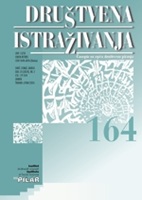THE ASSOCIATION BETWEEN NATIONAL HUMAN RESOURCE MANAGEMENT PRACTICES AND MEASURES AND CORRELATES OF NATIONAL HAPPINESS
THE ASSOCIATION BETWEEN NATIONAL HUMAN RESOURCE MANAGEMENT PRACTICES AND MEASURES AND CORRELATES OF NATIONAL HAPPINESS
Author(s): Nina Pološki Vokić, Maja KlindžićSubject(s): Social psychology and group interaction, Social Theory, Economic development, Socio-Economic Research
Published by: Institut društvenih znanosti Ivo Pilar
Keywords: subjective wellbeing; life satisfaction; happiness; national happiness; human resource management (HRM); CRANET;
Summary/Abstract: People's happiness has become a first-class political question, which urges both governments and organisations to create policies and practices aimed at improving people's happiness, one of which includes human resource management (HRM) practices. As studies exploring the association between country level HRM practices and national happiness on the academic level are scarce, especially empirical ones, the aim of this paper is exactly to address this gap. HRM data used in the study were collected through the Cranet 2014-2016 survey round and refer to 5,093 organisations operating in 27 countries on five continents. National happiness data, Cantril ladder indicator (CLI) as a measure, and six correlates of national happiness, were obtained from the World Happiness Report database. Findings suggest that HRM practices associated with the highest levels of national happiness include: using information technology (IT) recruitment platforms, recruiting based on potentials and not on present knowledge/skills, customised compensations, various work-life balance initiatives, and training and development primarily for career's and not employer's sake, which corresponds with younger workforce cohorts' preferences.
Journal: Društvena istraživanja - Časopis za opća društvena pitanja
- Issue Year: 33/2024
- Issue No: 2
- Page Range: 291-313
- Page Count: 23
- Language: English

